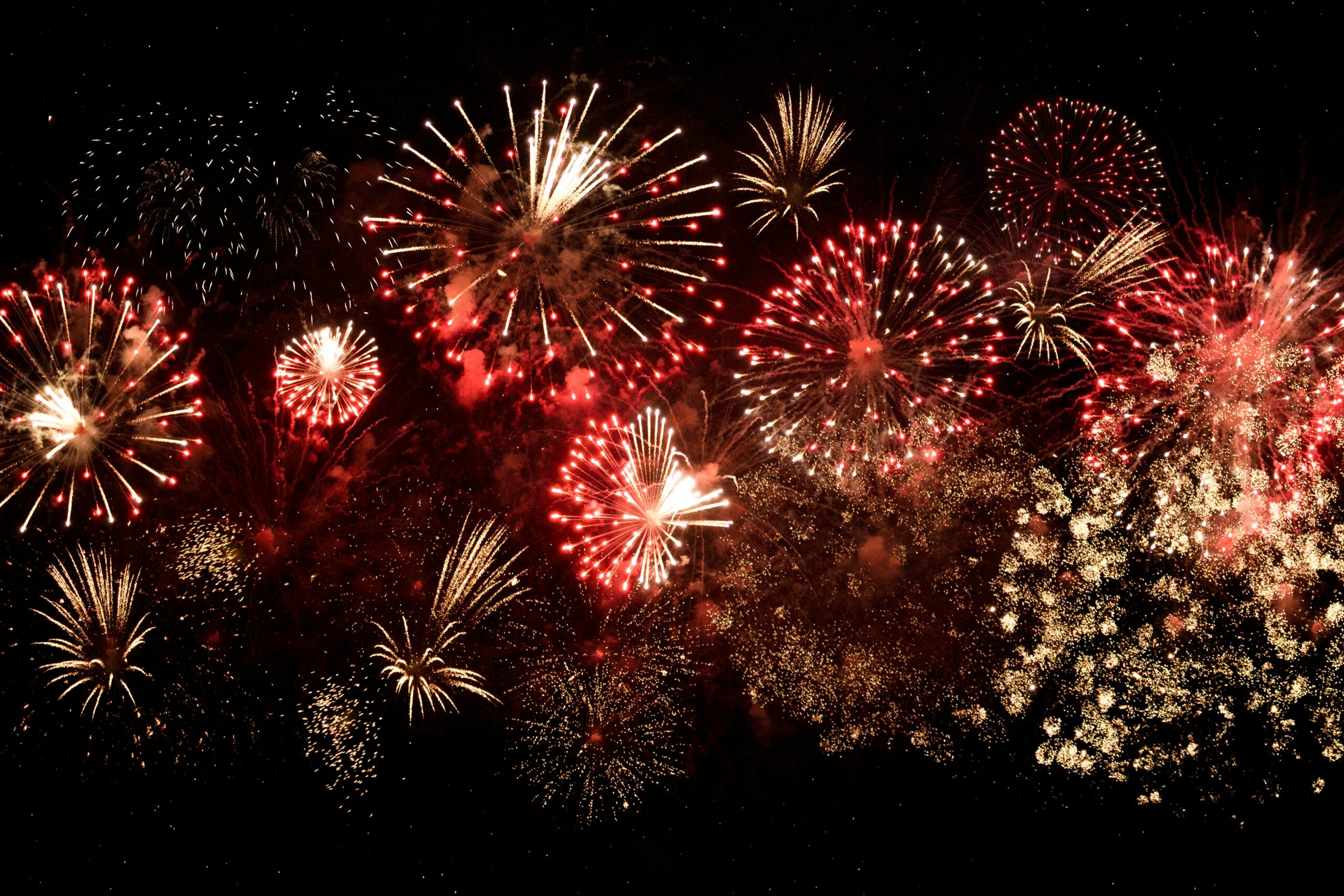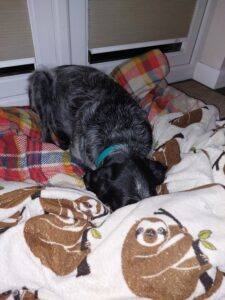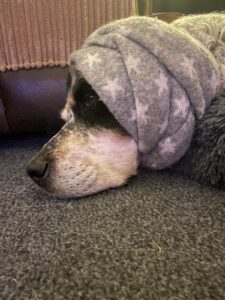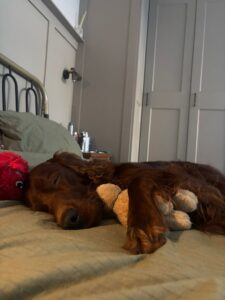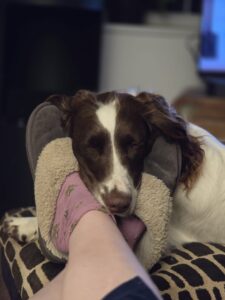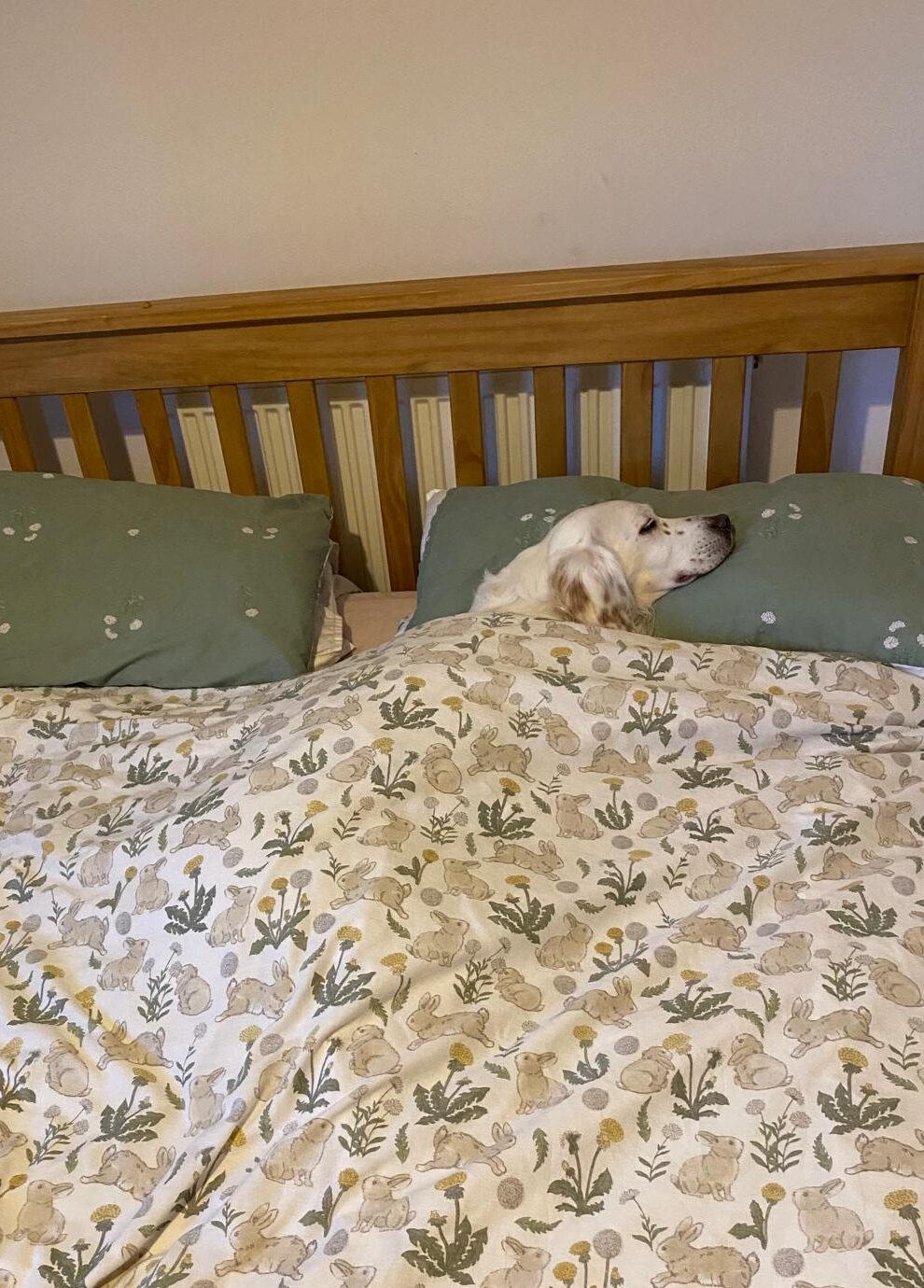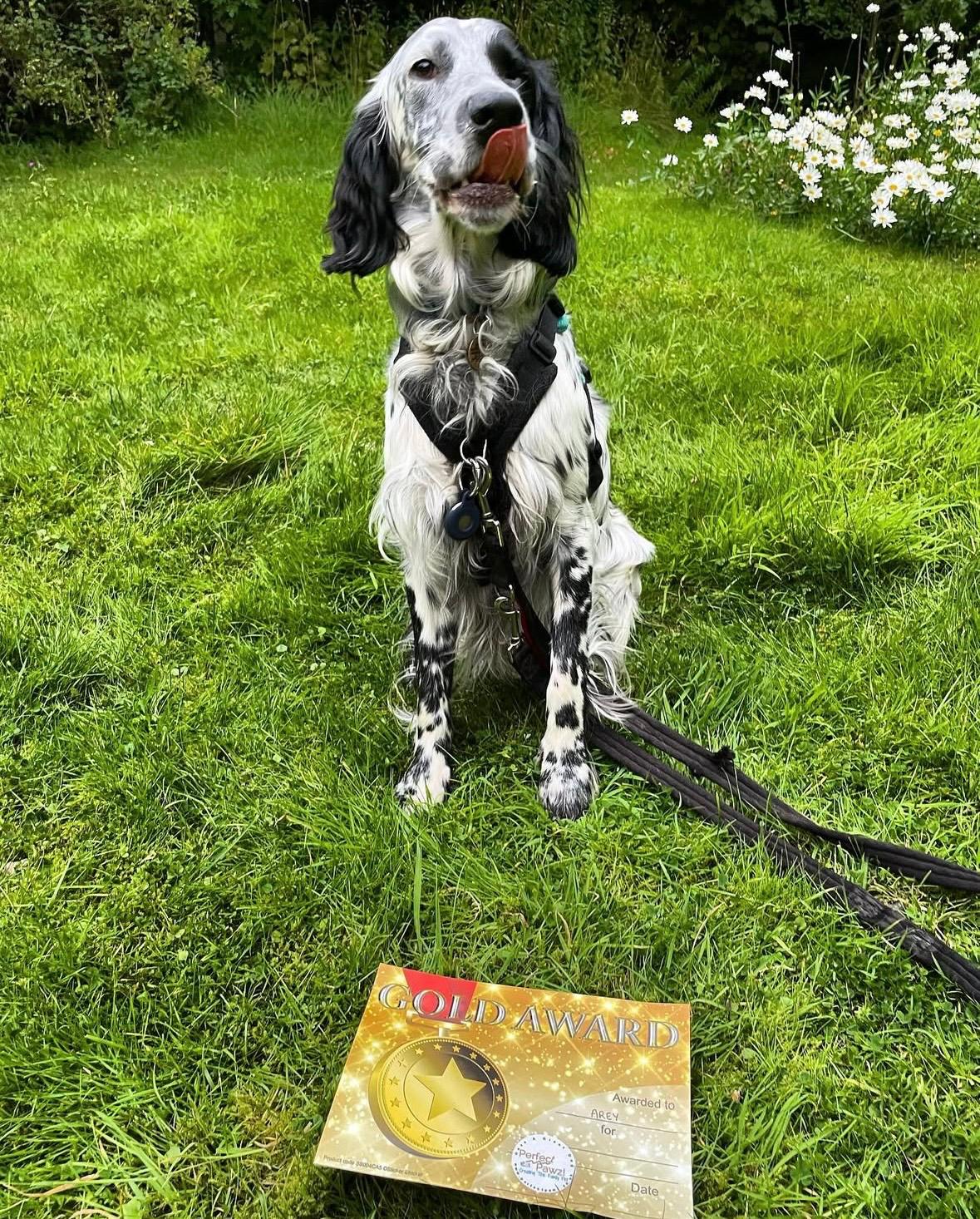“Remember, remember the 5th of November…”
For many pet owners (and our pets) bonfire night is not something we easily forget. Many animals find the loud sudden bangs, strange screeches, sudden flashes of light and the smell of smoke from fireworks a really frightening experience.
Sadly for many pet owners, fireworks don’t just occur on bonfire night or New Year’s Eve, and the ‘firework season’ can span across many of the winter months. We all want dogs that feel safe, happy and content, so this blog covers some tips to help you and your dogs have a calmer firework season.
Not all dogs are scared by fireworks, but surveys suggest around half of owners have reported their dogs becoming scared and distressed by fireworks to various extents.
If your dog doesn’t seem at all bothered by fireworks – that’s wonderful! But it’s also important to still keep vigilant and maintain a good routine around firework season as your dog may become distressed by them in the future.
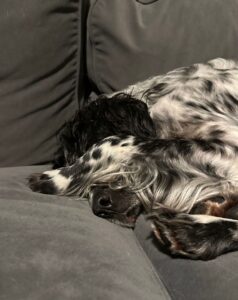
Signs your dog is scared by fireworks
Every dog is different and some will find fireworks far more distressing that others, but typical signs that show your dog is fearful during firework season include:
- Barking, whining – ‘vocalising’ their distress
- Excessive panting
- Drooling
- Tail between their legs
- Shaking or trembling
- Pacing
- Loss of appetite
- Clinginess
- Hiding
- Trying to escape an area
Survival tips
Preparation is key to supporting your dog through firework season.
Things you can do ahead of time include:
- Researching when any nearby firework displays are going to be held
- Arrange your schedule around key dates where fireworks are known to be happening and make sure you or someone close to your dog will be at home with them. Don’t leave them home alone.
- Adjust walk times – plan dog walks during daylight hours to ensure your dog is safely home before dark when most fireworks will be set off
- Food times – some dogs can become too anxious and stressed to eat. If this is your dog, feed them earlier in the day so they can enjoy their meal times before the onset of fireworks.
- Create a safe space – make sure your dog has a safe space in the house they can retreat to, make sure they have access to this area ahead of firework season and it is seen as a positive, calm and comfy place for them to spend time in.
- Dog calming diffusers – these can be useful for helping to calm your pet. However they don’t tend to work instantly so you should start using them a few weeks prior to the commencement of bonfire night/big known events. Popular brands include Adpatil and Pet Remedy.
- Prepare treats – prepare Lickimats and kongs in advance to give your dog a tasty treat for distraction during the night.
- Desensitisation – we’ll cover this more later on, but if you’re in a position to be able to prepare your dog well in advance to loud noises and help desensitise them before firework season, this can be really beneficial. However it is important to do this properly and not further overload a dog who is already stressed and low on spoons.
- Make sure your microchip details are up to date – in worst case scenarios, scared dogs can run! It is really important to keep your dog’s details up to date in case they go missing.
Firework night(s)
- Close all external doors and windows, draw the curtains and prepare for an evening in with your dog.
- Make sure your dog has access to you and to their safe space to retreat to.
- Pop the TV/music on to help drown out the noise of any fireworks. There are lots of free wonderful playlists available on Classic FM, YouTube, and lots of streaming platforms, all aimed at providing soothing background noise for your dog throughout firework nights. If your dog’s safe space is in a different room to the TV, why not pop a radio/tablet/speaker in there with them to play some calming music.
- Make sure your dog has access to clean, fresh water – stressed dogs can often drink more than usual.
Calming your dog
- Keep calm! It’s sometimes hard to do, especially when you see how upset and stressed your dog is, but try to remain calm around your dog. Seeing their family calm will help them to realise there is nothing to be scared of.
- Let them hide – If your dog hides in their safe space/under a sofa/table/bed etc, let them. Respect they are scared and need to retreat. Do not force them out from an area as this can stress them even more and frightened dogs can react.
- Reassure – If your dog comes to you for reassurance, give them it! If they need to cuddle with you, sit on your knee, be held – do not ignore them. Show them they are safe and loved.
- Distract, distract, distract. The more stressed your dog is, the harder it is to distract them but having things on hand like lickimats, tasty chews, kongs, puzzle feeders, can all help to provide a relaxing distraction for your dog. Activities where your dog is licking are proven to help calm and relax them. See our enrichment guide for ideas.
- ‘Soundproofing’ – You may be able to throw a blanket over their safe space to help further sound proof it. Some dogs will have success with ‘calming bands’/snoods to cover their ears and help reduce the noise.
- Do not tell your dog off! Your dog is stressed and out of spoons. It is totally reasonable for them to be scared by the loud bangs and weird noises of fireworks. Shouting at them will fix nothing and will only cause further stress.
- They do not need to face their fears! If your dog is too scared to venture out from a hiding space to go for a bedtime wee, that is okay. Making them confront fireworks isn’t desensitising them (see below).
- Going outside …. If your dog needs to go in the garden to do their business on an evening, pop their harness on, secure a lead and go with them in the garden. Even dogs who are seemingly fine with fireworks can get a fright and suddenly bolt from their gardens because a firework has unexpectedly gone off nearby. Scared dogs can run! Never underestimate the ability of a scared dog to scale a fence and flee. Keep them safe! Keep them on a lead in the garden and keep them company! It is far better to be over cautious than go through the worry and trauma of a missing dog on fireworks night.
- Speak to your vet – If you have a dog who is terrified during firework season, speak to your vet in advance. They may be able to prescribe medication to help your dog cope during particularly stressful events. Any medication should also be accompanied with a behavioural management plan and not instead of any of the other support mentioned.
Post firework night
If your dog has endured a stressful night of fireworks, don’t expect them to be back to their normal wonderful selves the following day. They have had a stressful experience and will be low on spoons! They need time to recover and replenish those spoons.
So if they seem less enthusiastic about walks, more lethargic, or generally more overwhelmed the days following firework nights – be understanding and help them recover and manage their spoons.
Desensitising your dog
Done correctly, desensitisation activities are a great way to help your dog learn that certain sounds and experiences are nothing to fear, and can help to keep them calm and happy during firework season.
This isn’t something you can start in the middle of firework season when your dog is already stressed, it needs to start during a calm time, with a relaxed dog. Ideally 3-6 months in advance.
The premise of desensitisation therapy is that you gradually, and in a controlled manner, expose a calm, relaxed dog to the trigger (for example recordings of firework noises at very low volumes). You have to closely monitor your dog’s reaction to ensure they aren’t becoming stressed at all by the trigger before they can be exposed further (for example playing sounds at a slightly higher level). The goal is to reduce your dog’s negative reaction (any signs of stress) to the trigger (noise of fireworks).
This is often coupled with counter-conditioning, where you use something positive like treats or toy whenever a trigger is played so your dog associates the trigger with a good experience they are not afraid of.
To do it well, desensitising your dog to fireworks noise or any trigger in general, takes time and patience. It is important to keep sessions short and frequent, not to overwhelm your dog, reward positive behaviour and know what to look for in their reactions.
There are some great online guides to help pet owners. Dogs Trust have some wonderful resources around ‘Scary sounds’ – see ‘Sound Therapy and firework training’.
If your dog is particularly anxious around fireworks however it is recommended to talk to a behaviourist so you can ensure you are supporting your dog properly and not overwhelming them.
Contact your rehomer if you want any advice or support on this and helping to find a good behaviourist.
Cover photo by DESIGNECOLOGIST on Unsplash

